 Viet Nam Human Rights
»
News
»
Poverty and economic inequality from Vietnamese citizens’ perspective in 2018
Viet Nam Human Rights
»
News
»
Poverty and economic inequality from Vietnamese citizens’ perspective in 2018
Poverty and economic inequality from Vietnamese citizens’ perspective in 2018
11/7/19
This article presents findings from the questions about issues of greatest concern for citizens in 2018, as part of the 2018 Vietnam Provincial Governance and Public Administration Performance Index (PAPI) Report, which captures experiences and perceptions related to governance and public administration performance at national and local levels in 2018 based on a survey of 14,304 citizens with different demographic characteristics, randomly selected from all 63 provinces and cities.One of the most important questions on the PAPI survey is an open-ended question asking citizens to identify the most important issue the Government should tackle. This question allows citizens to provide input as to where they feel the Government should devote its energy in subsequent year(s). This article presents findings from the analysis around those issues of great concern and provides food for thought for policymakers and practitioners on where there exist pressing needs that call for prompt responses.
As briefed in our article introducing key 2018 PAPI findings on the March & April 2019 issues of Vietnam Law and Legal Forum magazine, poverty was the issue of greatest concern in 2018 by far, and this has been the case since 2015 when the question was introduced. Approximately 25 percent of citizens cited it as a top concern in 2018, with economic growth coming in second and corruption third. Economic growth and jobs/employment were among the five most important issues in 2018, among which were also corruption and environment.
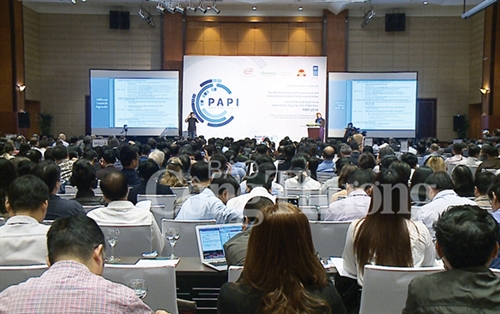 |
| A press conference held in Hanoi on April 2 to release the 2018 PAPI Report__Photo: congthuong.vn |
Poverty: greatest concern and why
While Vietnam’s economic growth rate in 2018 was reported to reach 7 percent, Vietnamese citizens continued to cite poverty and hunger as the two top matters requiring additional efforts by the State. Poverty ranked first in the list of issues of greatest concern for the fourth year in a row. As Figure 1 shows, since 2015, concern about poverty was constantly probed by larger proportions of the population. Approximately 25 percent of all respondents cited it as a top concern in 2018, a slight drop from the peak rate of 28 percent in 2017.
Deeper analysis into PAPI data shows that the concern about poverty is on a number of reasons. First, it is about the fear about falling back into poverty among the respondents. Since 2017, respondents have been asked about why they are most concerned about poverty if they show the concern. The 2017 and 2018 findings show that, between 44 and 45 percent of the respondents were worried that they would fall back into poverty; and 55 to 57 percent worried about their families falling back into poverty. When disaggregated by income levels, the lower income respondents earned the more concerned about falling back into poverty they were. (see on Figure 1)
| Figure 1: Change in issues of greatest concern, 2015-18 |
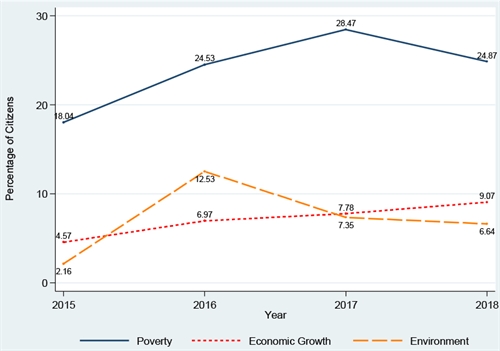 |
Second, and more interesting, many concerned about the impact of poverty on overall national development. It is interesting that a majority of those who chose poverty as the greatest concern shared that poverty reduction has large implications for Vietnam’s development, with 86 to 89 percent of the respondents in all income strata selecting this option to explain about why they were concerned about poverty in 2017 and 2018.
Third, income inequality was a significant driver. When looking deeper into the income strata and examining the correlation with poverty concern, it shows that income inequality is a significant driver of poverty concerns. As many as 90 percent of the PAPI respondents earned less than VND 20 million (about USD 820) per person per month in 2018, compared with 10 percent earning more than VND 20 million (of whom only 1.7 percent earn more than VND 40 million). (see on Figure 2)
| Figure 2: Monthly income distribution of PAPI respondents, 2018 |
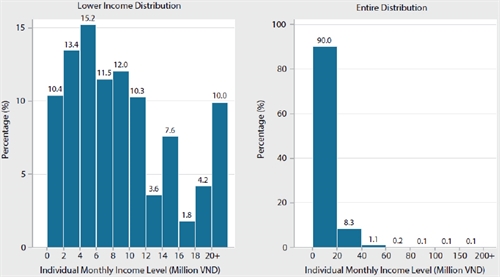 |
As Figure 3 shows, the income gap between ethnic minorities and Kinh majority is significant at VND 3 million per person per month (i.e., VND 10 million for Kinh and VND 7 million for non-Kinh). The income gap is greater between rural and urban ethnicities. For a rural Kinh, an average monthly income was about VND 4 million greater than a rural ethnic minority individual; and an urban Kinh person earned about VND 1.5 million greater than an urban ethnic minority person. (see on Figure 3)
| Figure 3: Income levels in Vietnam by ethnicity |
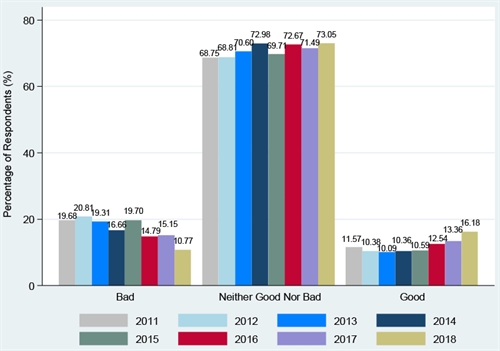 |
To assess the role that income plays in citizens’ attitudes toward poverty, economic inequality and redistribution policy, regression analysis was undertaken to examine how income is linked to these attitudes. Consistent with our expectations, poorer respondents were more concerned about poverty than those with higher incomes in 2018. Nearly 40 percent of those at the lowest income levels felt poverty reduction should be a national priority. However, despite the relationship, the effect is not as strong as one might presume. For instance, an estimated 31 percent of those earning VND 40-42 million per month still expressed concern about poverty reduction. However, gender is far more correlated with concern about poverty; women were almost 10 percent more likely than men to view poverty as an important concern.
Such findings highlight the fact that inclusive and equitable economic development remains a priority for Vietnam as it aims to become a high middle-income country. The differences in priorities between men and women imply the need for equitable representation in government leadership positions for both genders so that matters that are of women’s concern will be equally addressed as men’s concern.
Economic inequality
In 2018, Vietnam’s gross domestic product (GDP) growth rate was 7.08 percent, reported to be the highest since 2008, according to a recent report by the General Statistics Office. This improvement in national economic conditions is reflected in the data about citizens’ perceptions of their household economic conditions in the year. The PAPI findings over time show a higher level of citizen optimism about their current household economic conditions (see Figure 4). Although the vast majority continued to say that their household economic situation was neither good nor bad, there was a decrease in the percentage saying their situation was poor, and there was a clear increase in the percentage saying their situation was good. This matches the positive trends observed in the 2011-18 Basic Asset Index from PAPI surveys from 2011 to 2018 as presented in Figure 5. The year 2018 also witnessed a clear jump in the percentage of citizens saying that they expected their household economic situation to improve in the next five years. (see on Figure 4 and Figure 5)
| Figure 4: Citizens’ perception of current household economic situation, 2011-18 |
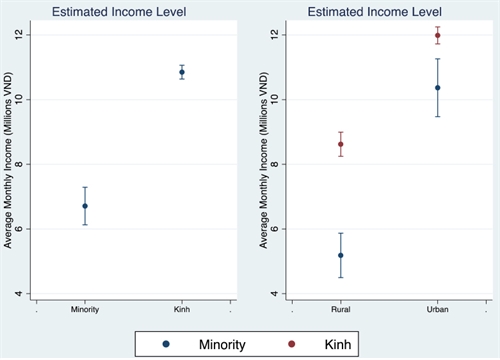 |
| Figure 5: Household Asset Index from PAPI surveys, 2011-18 |
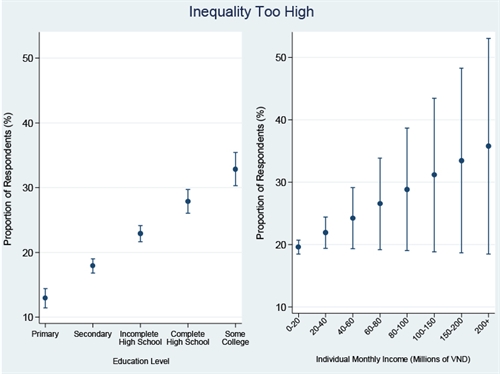 |
Given optimism about the economic situation of households may impact citizens’ assessment of different aspects in PAPI, we went further in assessing citizens’ attitude toward economic inequality in 2018. In general, a large proportion of respondents did not feel that the current rich-poor gap in Vietnam is a significant problem. In 2018, there were more respondents who said that the gap was either very narrow or narrow, or neither narrow nor large, than those who said that the gap was large or very large. Furthermore, since 2016, less than 30 percent of respondents have said that current economic inequality is too high. As economic conditions have improved over the past years, a declining number of respondents have expressed concern about inequality levels.
Another important question is how concern about inequality corresponds to income levels. In short, are poorer respondents left behind during the economic growth of recent years more likely to express concern about inequality? Figure 6 shows that this is not the case. The relationship between income and concern about inequality is quite weak, and if anything, positively correlated with income. That is, wealthier respondents seem to be more concerned with inequality than lower-income respondents. Further analysis shows that the factor with the strongest impact on a respondent’s concern about inequality is education; more educated respondents are more likely to express concern than less educated respondents. (see on Figure 6)
| Figure 6: Concern about inequality by income and education levels, 2018 |
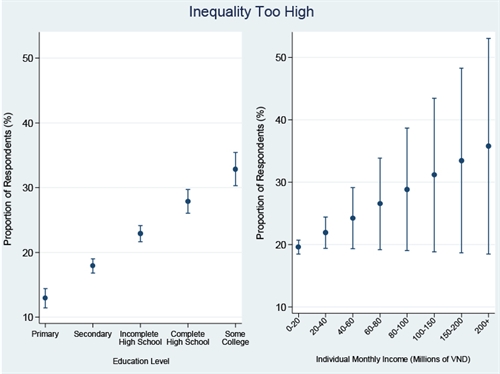 |
The analysis reveals that although poverty remains the issue of greatest concern, particularly among the poor, the rich-poor gap is less important, even among poorer respondents. This leads to the next question about willingness to pay taxes for wealth redistribution to poorer areas. Provincial transfers help provide increased resources for poorer areas. One might presume that richer respondents, who stand to gain less from individual or provincial transfers, would be less likely to support the policy of collecting taxes for redistribution through provincial transfers. However, as deeper analysis results show, this is decidedly not the case. It is not the poorest respondents who are more supportive of paying more taxes for wealth redistribution from their province to poorer provinces, but rather the wealthier respondents.
Findings from the PAPI surveys show that, despite rapid declines in poverty and improvements in economic conditions, many Vietnamese, particularly those in lower income strata, remain concerned about poverty. As the Government continues searching for solutions to poverty reduction and higher economic growth, they should consider the types of policy options citizens would support. The PAPI data show that while there is a high level of support for paying taxes for redistribution of wealth for poverty assistance in poorer provinces, the support is greatest among wealthier and more educated respondents who have more resources and willingness to contribute to further poverty reduction. With 90 percent of the population earning less than VND 20 million per person per month, and a much smaller group of wealthier people, policy on tax-based redistribution should be well-articulated and well-designed so as not to upset low income earners.
The findings suggest a complex relationship between concerns about poverty, attitudes toward economic inequality, and wealth redistribution. In short, while those at the lower end of the income scale are more likely to see poverty as an important concern, this does not necessarily translate into similar attitudes about inequality or support for redistributive policies. As the findings show, poorer respondents are no more likely than richer respondents to view inequality as an important concern, nor are they more likely to see wealth redistribution as a desirable policy. One possible explanation is that poorer respondents are skeptical that increased resources from their taxes to local governments will actually reach poor people in other provinces. Alternatively, poorer respondents might feel that it is unlikely that richer respondents will be targeted to pay for poverty reduction programs, thus lowering the redistributive effects. These potential explanations demand further exploration.-

Popular Posts
-
Religion is a part of the spiritual life in society, this phenomenon of the superstructure has been strongly changed with economic - social...
-
Vietnam has just done well for the second cycle of Universal Periodical Review (UPR) in Geneva, Switzerland. So, what’s the UPR? an...
-
Representatives from foreign countries congratulate Viet Nam on its election to the Human Rights Council for the first time on November ...
-
A street flowers vendor in Hanoi Another new spring has come to Vietnam, bring...
-
Thai people in Shutdown Bangkok protests Not until this crisis, we have realized the ne...
-
If nothing changes, there will be a preferential credit program with hundreds of thousands billion of capital for agriculture and r...
-
Recently, several anti-governmental individuals have established series of illegal groups and organizations in the name of civil soci...
-
Child sexual abuse has been on the increase in Vietnam in recent years according to the Ministry of Labour, Invalids and Social Affairs....
Blog Archive
-
▼
2019
(
549
)
-
▼
tháng 7
(
46
)
- Vietnam attends UN Human Rights Council’s 41st ses...
- Service package launched to prevent child labour, ...
- Assistance offered to Vietnamese women married to ...
- Will “UN@75” Revive Multilateralism?
- A Roadmap for Children as Victims, not Terrorists
- UNESCO forum on education for sustainable developm...
- EVFTA affirms Vietnam's human rights achievements
- Vietnam accepts nearly 83% of UN’s human rights re...
- Vietnam attends 2019 Global Summit of Women
- Vietnam among one of 10 best places for expats: HSBC
- Are We Fighting a Losing Battle in the War Against...
- Over 3,100 cyber attacks hit Vietnam in six months
- Vietnam actively takes actions to reduce plastic w...
- Roadmap to realize 2030 sustainable development goals
- Vietnamese Embassy in RoK protects Vietnamese woma...
- Western joke: Two large news agencies banned from ...
- Hanoi to intensify efforts to improve population q...
- Poverty and economic inequality from Vietnamese ci...
- Affirming position of City for Peace
- Series of celebration activities to mark 20th anni...
- Vietnam becomes 15th most populous nation
- Ideas gathered for national review on gender equal...
- Vietnam and US expperts exchange Marxist theory
- Hanoi – cradle of cultural heritage
- UNHRC adopts resolution on climate change and huma...
- Vietnam marks a milestone in human rights protection
- Community Action Is a Critical Weapon in the War o...
- Unemployment insurance covers nearly 13 million pe...
- Thousands of children in remote province recieve f...
- Vietnam targets accelerating promises in realising...
- Vietnam Summer Camp 2019 opens
- A Relentless Battle Against Poverty & Hunger in Wo...
- Fighting against the plot to use the issues on eth...
- European Parliament raises concern about worst ref...
- Vietnam considers sending civil force to UN peacek...
- Vietnam shares experience in SDG implementation
- How Governments Still Allow Violence Against Children
- Concerted measures needed to ensure energy security
- Lantern festival marks invalids, martyrs’ day
- Vietnam resolved to fight violations of its sea areas
- 10,000 Vietnamese at deportation risk in Trump’s c...
- Sexual Exploitation of Minors is a Crime Against H...
- Vietnam calls on NAM to keep promoting adherence t...
- How Best to Tackle Inequality in the 21st Century?...
- Vesak 2019 demonstrates VN’s respect for freedom o...
- How Widespread is Human Trafficking in the US?
-
▼
tháng 7
(
46
)









All comments [ 20 ]
Poverty remains a top concern among Vietnamese people, according to a report evaluating the country’s public administrative procedures.
poverty and hunger, economic growth and corruption are the three top concerns of Vietnamese citizens.
Poverty is also more likely to be the top concern for respondents in the lower monthly income brackets.
a large proportion of respondents did not feel that the current rich-poor gap in Vietnam was a significant problem.
poorer respondents were no more likely than richer ones to view inequality as an important concern, the report said.
Respondents in the higher monthly income brackets, while standing to gain less from wealth redistribution efforts, were more supportive of paying more taxes than their poorer counterparts.
The data suggested a complex relationship between concerns about poverty, attitudes towards economic inequality and wealth redistribution among Vietnamese people.
Poorer respondents might be skeptical about tax revenues actually reaching the people who need them the most, or that richer respondents are less likely to be targeted by poverty reduction programs
Despite boasting a record-breaking GDP growth of 7.08 percent last year, nine million Vietnamese people are still living in extreme poverty, earning less than $2 per day, according to a World Bank report.
While poverty rates are dropping, there are more people falling back into poverty
Poverty reduction is not steady, and the gap between the rich and the poor has not been decreased, especially in the northern mountains and central highlands
This is an article about households, not a single person; VND900,000 ($38.7) in cities. This might barely pay for a single weeks of food for ONE person only, whilst bills remain due.Definition changes and name games not reduce poverty, they just hide it and make it even harder for those needy, to claim, what they should be entitled to; a humain existence
As every one in Vietnam tries to get ahead of the next of kin and a few make a fortune for themselves with often not the nicest of methods, one wonders why this country - in the middle of the race of Asian Tigers - is not capable of being one of the modern-est countries in the world, with renewable energy, electric vehicles, decent infrastructure and urban planning. The tiger will never get to its prey.
Việt Nam’s richest citizens can earn roughly 5,000 times more money in an hour than the poorest Vietnamese spend in a day.
how big the inequality gap between the richest and poorest has become in the country.
economic inequality has triggered inequalities of voice and opportunity.
the inequality has made ethnic minorities, small-scale farmers, migrant workers and women more likely to be poor, more likely to suffer the most from discrimination and more likely to be unable to access to public services or participate in decision-making processes.
inequality between the rich and the poor is a common issue many ountries in the world are facing.In Việt Nam, the National Assembly has realised the situation and issued many policies to help people escape from multidimensional poverty for years.
In term of policy, it needs to be designed to ensure every person has a chance to access basic services, especially education and healthcare.
If we have the attitude of not accepting inequality, our society will become more fair and equal
Your comments